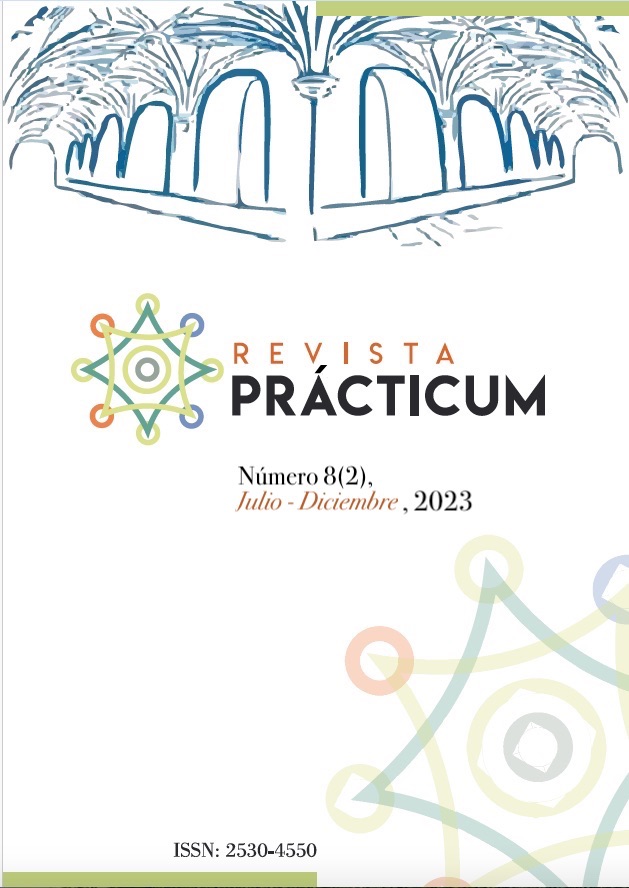Analysis of the emotional dimension of the student body in teaching practices
DOI:
https://doi.org/10.24310/rep.8.2.2023.17041Keywords:
Practicum, Initial teacher training, Social-emotional competence, Emotional vocabularyAbstract
This paper describes the results of a qualitative cases study aimed at exploring the emotional facet of pre-service teachers during their academic practices. Thirty fourth-year students of the Bachelor's Degree in Education from a university in Madrid participated in the study. A form was developed to obtain the data and the reflexive tales written by the students were considered throughout different stages of the academical practices. This paper presents the results related with two research questions: which are the emotions that were felt and identified by the participants, and the sequence with which they appear throughout the entire practice. The results present the need of introducing the emotional skills used in the practicum thus, by encouraging the emotional awareness, they learn how to handle the emotions in the class, which lead into a professional performance profitable for learning of the children.
Downloads
Metrics
References
Aspelin, J. (2017). In the heart of teaching: A two-dimensional conception of teachers’ relational competence. Educational Practice and Theory, 39 (2), 39-56. https://doi.org/10.7459/ept/39.2.04
Aspelin, J. (2019). Enhancing pre-service teachers’ socio-emotional competence. The International Journal of Emotional Education, 11(1), 153-168. https://eric.ed.gov/?id=EJ1213620
Barrett, L. F. (2018). La vida secreta del cerebro: Cómo se construyen las emociones. (1ª ed.) Paidós.
Belli, S. (2009). La construcción de una emoción y su relación con el lenguaje: Revisión y discusión de un área importante de las ciencias sociales. Teoría, 18 (2), 15-42. https://www.redalyc.org/articulo.oa?id=29917006003
Bello, A., & Crego, A. (2003). Automanejo Emocional. Pautas para la intervención cognitiva en grupos. (2ª ed.). Desclée De Brouwer.
Besnier, N. (1990). Language and Affect. Annual Review of Anthropology, 19, 419–451. http://www.jstor.org/stable/2155972
Bisquerra, R., & Filella, G. (2018). Análisis del vocabulario emocional en el profesorado de lengua. Revista Electrónica Interuniversitaria de Formación del Profesorado, 21(1), 161-172. http://dx.doi.org/10.6018/reifop.21.1.298421
Bisquerra, R., & Laymus, G., (2020). Diccionario de emociones y fenómenos afectivos. (3ªed.). PalauGea.
Bisquerra, R. (2009). Psicopedagogía de las emociones. Editorial Síntesis.
Brackett, M. A., Bailey, C. S., Hoffmann, J. D., & Simmons, D. N. (2019). RULER: A theory-driven, systemic approach to social, emotional, and academic learning. Educational Psychologist, 54(3), 144–161. https://doi.org/10.1080/00461520.2019.1614447
Brackett, M.A, Rivers, S., Reyes, M., & Salovey, P. (2012). Enhancing academic performance and social and emotional competence with the RULER feeling words curriculum. Learning and Individual Differences, 22(2), 218-224. https://doi.org/10.1016/j.lindif.2010.10.002
Buitrago-Bonilla, R. E., & Cárdenas-Soler, R. N. (2017). Emociones e identidad profesional docente: relaciones e incidencia. Praxis & Saber, 8(17), 225–247. https://doi.org/10.19053/22160159.v8.n17.2018.7208
Campayo-Julve, R., & Sánchez-Gómez, M. (2020). Inteligencia emocional en maestros de educación primaria: Una propuesta práctica para su desarrollo. Edetania. Estudios y Propuestas Socioeducativos. (58), 55–78. https://doi.org/10.46583/edetania_2020.58.689
Castillo-Gualda, R., García, V., Pena, M., Galán, A., & Brackett M. A. (2017) Resultados preliminares del método RULER en la inteligencia emocional y el compromiso laboral de profesores españoles. Electronic journal of research in educational psychology. 15(43), 641-664 https://doi.org/10.25115/ejrep.43.17068
Danes, F. (1994). Involvement with language and in language. Journal of Pragmatics, 22(3-4), 251-264. https://doi.org/10.1016/0378-2166(94)90111-2
Díaz, J.L., & Flores, E. (2001). La estructura de la emoción humana. Un modelo cromático del sistema afectivo. Salud Mental, 24(4), 20-35. http://www.redalyc.org/articulo.oa?id=58242403
El-Dakhs, D. A. S., & Altarriba, J. (2019). How do emotion word type and valence influence language processing? The case of Arabic-English bilinguals. Journal of psycholinguistic research, 48(5), 1063–1085. https://doi.org/10.1007/s10936-019-09647-w
Espot, M., & Nubiola, J. (2019). Alma de profesor. La mejor profesión del mundo. Editorial Desclée.
Extremera, N., Mérida-López, S., Sánchez-Álvarez, N., Quintana-Orts, C., & Rey, L. (2019). Un amigo es un tesoro: inteligencia emocional, apoyo social organizacional y engagement docente. Praxis & Saber, 10(24), 69-92. https://doi.org/10.19053/22160159.v10.n25.2019.10003
Fernández-Gavira J, Castro-Donado S, Medina-Rebollo D., & Bohórquez MR. (2021) Development of emotional competencies as a teaching innovation for Higher Education Students of Physical Education. Sustainabilit, 14(1), 2-20. https://doi.org/10.3390/su14010300
Fernández-Molina, M., Bravo Castillo, A., & Fernández-Berrocal, P. (2019). Perfiles de Inteligencia emocional percibida en futuros maestro/as de educación infantil: implicaciones para la formación de maestros. Revista Electrónica Interuniversitaria de Formación del Profesorado, 22(1), 209-223 https://doi.org/10.6018/reifop.22.1.344131
Forés, A., Novella, A., Venceslao, M., & Costa, S. (septiembre de 2014). Las emociones: punto de partida y llegada en el prácticum de educación social. I Congrés Internacional d’Educació Emocional. X Jornades d’Educació Emocional. Psicología positiva i bienestar. Barcelona. España. http://hdl.handle.net/2445/58751
García-Campos, M. D., Canabal-García, C. C., & Margalef García, L. M. (2022). Procesos de reflexión colaborativa en la formación inicial docente. REDU. Revista de Docencia Universitaria, 20(2), 91-106. https://doi.org/10.4995/redu.2022.15665
Gilar-Corbi, R., Pozo-Rico, M., Pertegal-Felices, M.L., & Sánchez, B. (2018). Emotional intelligence training intervention among trainee teachers: a quasi-experimental study. Psicologia: Reflexão e Crítica. 31(33), 1-13. https://doi.org/10.1186/s41155-018-0112-1
Grosse, G., Streubel, B., Gunzenhauser, C. et al. (2021). Let’s talk about emotions: the development of children’s emotion vocabulary from 4 to 11 years of age. Affective Science 2, 150–162. https://doi.org/10.1007/s42761-021-00040-2
Hoffmann, J. D., Brackett, M. A., Bailey, C. S., & Willner, C. J. (2020). Teaching emotion regulation in schools: Translating research into practice with the RULER approach to social and emotional learning. Emotion, 20(1), 105–109. https://doi.org/10.1037/emo0000649
Latorre, M.J., & Blanco, F.J. (2011). El prácticum como espacio de aprendizaje profesional para docentes en formación. Revista de docencia universitaria. 9(2), 35-54. https://doi.org/10.4995/redu.2011.6157
Lindquist, K., MacCormack, J., & Shablack, H. (2015). The role of language in emotion: predictions from psychological constructionism. Hypothesis and theory, 6(444), 1-17. https://doi.org/10.3389/fpsyg.2015.00444
Mérida-López, S., & Extremera, N. (2017). Emotional intelligence and teacher burnout: A systematic review. International Journal of Educational Research, 85, 121-130. https://doi.org/10.1016/j.ijer.2017.07.006
Muñoz Martínez, Y., Domínguez Santos, S., Madarova, S., de la Sen Pumares, S., & García Laborda, J. (2021). Prácticum Inclusivo: Creando redes de aprendizaje y colaboración entre los estudiantes, los maestros y la Facultad de Educación. Revista Interuniversitaria de Formación del Profesorado, 96(35.3), 205–224. https://doi.org/10.47553/rifop.v96i35.3.89093
Nathanson, L., Rivers, S. E., Flynn, L. M., & Brackett, M. A. (2016). Creating emotionally intelligent schools with RULER. Emotion Review, 8(4), 305–310. https://doi.org/10.1177/1754073916650495
Ohira, H. (2020). Predictive processing of interoception, decision-making, and allostasis: A computational framework and implications for emotional intelligence. Psihologijske teme, 29 (1), 1-16. https://doi.org/10.31820/pt.29.1.1
Pérez-Bonet, G., & Velado-Guillén, L. Ángel. (2017). Inteligencia emocional percibida (IEP) en el alumnado universitario de educación. Análisis comparativo por género y grado. Escuela Abierta, 20(1), 23–34. https://doi.org/10.29257/EA20.2017.03
Perni, C., (2021). Diccionario de emociones, sentimientos y estados de ánimo. Autoedición.
Phelps, E. A., & Sharot, T. (2008). How (and why) emotion enhances the subjective sense of recollection. Current Directions in Psychological Science, 17(2), 147–152. https://doi.org/10.1111/j.1467-8721.2008.00565.x
Rendón, M. A. (2019). Competencias socioemocionales de maestros en formación y egresados de programas de educación. Praxis y Saber, 10(24), 243–270. https://doi.org/10.19053/22160159.v10.n25.2019.10004
Tejada-Fernández, J. (2005). El trabajo por competencias en el prácticum: cómo organizarlo y cómo evaluarlo. Revista Electrónica de Investigación Educativa, 7(2). http://redie.uabc.mx/vo7no2/contenido-tejada.html
Tejada-Fernández, J., Carvalho-Dias, M. L., & Ruiz-Bueno, C. (2017). El prácticum en la formación de maestros: percepciones de los protagonistas. Magis, Revista Internacional de Investigación en Educación, 9(19), 91–114. https://doi.org/10.11144/Javeriana.m9-19.pfmp
Tejada-Fernández, J., & Ruiz-Bueno, C. (2013). Significación del prácticum en la adquisición de competencias profesionales que permiten la transferencia de conocimiento a ámbitos propios de la acción docente. Profesorado. Revista de currículum y formación del profesorado, 17(3), 91-110 https://recyt.fecyt.es/index.php/profesorado/article/view/41974
Salgado Ramírez, A., García Mendoza, L.Y., & Méndez-Cadena, M.E., (2020). La experiencia del estudiantado mediante el uso del diario. ¿Una estrategia para la metacognición? Revista Educación, 44(1), 1-34. https://doi.org/10.15517/revedu.v44i1.38291
Sandín, M.P. (2003). Investigación cualitativa en educación. Fundamentos y tradiciones. Mc Graw and Hill Interamericana de España.
Sarceda-Gorgoso, M.C., Barreira-Cerqueiras, E.M., & Caldeiro-Pedreira, M.C. (2020). El Prácticum en la formación del profesorado técnico de FP. Revista Practicum, 5(1), 37-53. https://doi.org/10.24310/RevPracticumrep.v5i1.9829
Schonert-Reichl, K. A. (2017). Social and Emotional Learning and Teachers. The Future of Children 27(1), 137-155. doi:10.1353/foc.2017.0007.
Seth, A. (2023). La creación del yo. Una nueva ciencia de la conciencia. Sexto piso.
Simmons, D. (2019). You can´t be emotionally intelligent without being culturally responsive: Why FCS must employ both to meet the needs of our nation. Journal of family & consumer sciences, 111(2), 7-16 https://doi.org/10.14307/JFCS111.2.7
Simons, H. (2011). El estudio de caso: Teoría y práctica. Madrid: Ediciones Morata.
Vine, V., Boyd, R.L., & Pennebaker, J. W. (2020). Natural emotion vocabularies as windows on distress and well-being. Nature Communications, 11, 4525. https://doi.org/10.1038/s41467-020-18349-0

Downloads
Published
How to Cite
Issue
Section
License
Copyright (c) 2023 Cristina Picazo-Valencia, Maria Dolores García-Campos (Autor/a)

This work is licensed under a Creative Commons Attribution-NonCommercial-ShareAlike 4.0 International License.
Acceptance of the work implies that the author grants Revista Prácticum the exclusive rights to reproduce, distribute and sell his or her work worldwide, both in digital and paper formats, CD-ROM, etc.
Likewise, the authors shall grant Revista Prácticum the rights of dissemination, public communication on the Internet and IT networks, data buses, as well as any other portals or electronic devices for online consultation of its contents and extracts, under the conditions of the portal, repositories or databases where the work is stored.
Revista Prácticum allows authors to publish and disseminate their articles and works on their personal websites, research teams, institutional repositories and scientific databases. All this in accordance with the Creative Commons 4.0 License








8.png)








